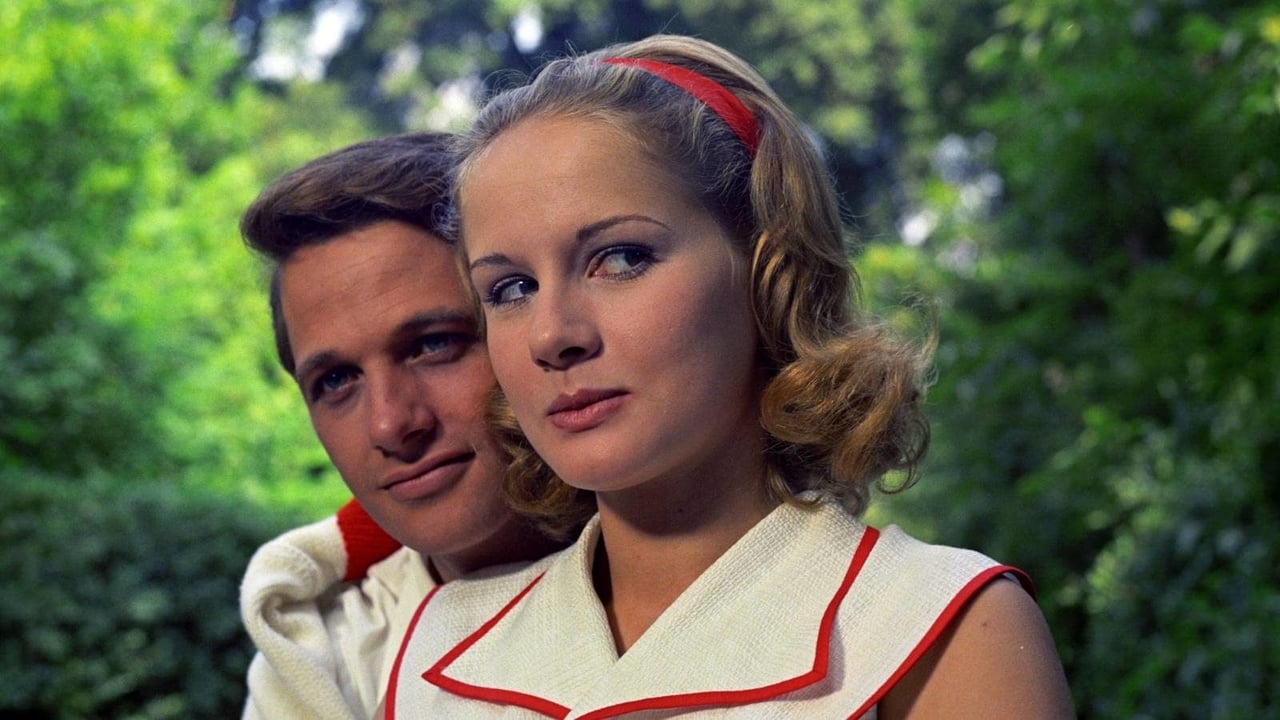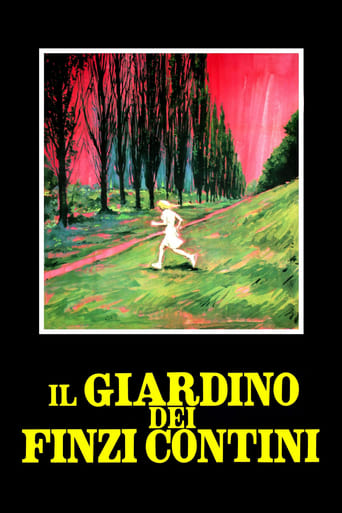Scanialara
You won't be disappointed!
Whitech
It is not only a funny movie, but it allows a great amount of joy for anyone who watches it.
Livestonth
I am only giving this movie a 1 for the great cast, though I can't imagine what any of them were thinking. This movie was horrible
Orla Zuniga
It is interesting even when nothing much happens, which is for most of its 3-hour running time. Read full review
gavin6942
In the late 1930s, in Ferrara, Italy, the Finzi-Contini are one of the leading families, wealthy, aristocratic, urbane; they are also Jewish. Their adult children, Micol and Alberto, gather a circle of friends for constant rounds of tennis and parties at their villa with its lovely grounds, keeping the rest of the world at bay. Into the circle steps Giorgio, a Jew from the middle class who falls in love with Micol."The Garden of the Finzi-Continis" won the Academy Award for Best Foreign Language Film and was nominated for Best Screenplay Based on Material from Another Medium. It won the Golden Bear at the 21st Berlin International Film Festival in 1971. It is considered de Sica's penultimate film, though this depends on how you count.The film itself is very beautiful, and the quality would make me think 1980s more than 1970. Italian cinema tends to be behind American cinema in technology, and I am quite impressed with what they were able to achieve here. It really is something of a masterpiece in the look. The characters are well fleshed-out, and I am not surprised that some of the actors went on to bigger things (e.g. Helmut Berger).One thing that strikes me as interesting today (2017) is how films around the Holocaust have been consistently successful in awards season. This was almost 50 years ago, and today we still get the Holocaust film again and again. That is not a criticism of the filmmakers. There is no story more powerful in the last 100 years. It just strikes me as interesting how film has chosen that as the nexus, the focal point. You might think American films would try to pivot to 9/11 (admittedly a far, far smaller event), but this has not really happened.
evanston_dad
Director Vittorio De Sica eschews the neo-realism that defined his earliest work and takes a more poetic approach with this story about a wealthy, privileged family who shut themselves away from the encroaching threat of fascism in the early days of WWII Italy. They ultimately find that their elite status does not protect them from the fascist threat, and the quietly devastating ending shows the family being separated, perhaps forever, as they are rounded up and herded into lines like so much cattle.The ending makes this film memorable, but everything proceeding it struck me as rather lightweight, given the subject matter. This isn't a movie I think back on as a masterpiece, and I think its reputation rests somewhat on the fact that De Sica, a respected master, directed it.Grade: B+
delgrandegl
I just watched the DVD and had not seen the movie in many years. I found it every bit as moving as I had remembered from my first viewing. This included the Prayer For the Dead (El Moleh Rachamim) magnificently sung as the final credits rolled. I am not Jewish so I had to do some "googling" to learn that El Moleh...is indeed a prayer for the dead. What moved me so apart from the singer's mournfully beautiful voice were the names Aushwitz, Maidenek, Treblinka et. al. interpolated into the text. It reminded me of the penultimate paragraph in Andre Schwartz-Bart's extraordinary novel of the Holacaust, The Last Of The Just where the names of the death camps are artfully placed among the repeated words "And praised Be The Lord". Thank you for the opportunity to share my thoughts.
tedg
De Sica is celebrated as the man who brought "neo-realism" to film, one of the three or four philosophies that still vie as motivation for the film enterprise. It is the notion that though film necessarily artificializes, it is possible to start with truth and deliberately enhance it cinematic ally. Because he relied on class struggle, viewers mistakenly associate that with the essence of neo-realism.His early work is much celebrated, but as he aged and added layers and nuance, his relatively simpleminded audience was lost. Here we have a later masterpiece, not generally regarded as such.The basic story is of two Jewish families, the impeding brutality of fellow Italians and different approaches to life and love in the knowing face of doom. At that level, it has some charm and power.But what he has done is to invert all the values and superimpose them on the originals. Its a common technique in writing, and found of course in the novel. We have the obvious: a relatively small garden within which the inhabitants blithely create an artificial world while the real world grinds down upon them. The garden is in Europe, but it is also Europe.As I say, That's obvious. Also common (far too common) is the placement of sexual mechanics in political mechanics as if one explains the other while they cause each other. Ho Hum. But there are three other elements, and these I appreciate. While he is reversing things and overlaying them, he casts accordingly. The European fiction was that Jews were dark, earthy people. Hairy, monetary, shrewd, animal. Yet the actors who play the Jews are according to cinematic conventions of Aryans: light haired, light skinned, svelte. Their manner is similarly cinematic (and the Nazi/fascist movement was inherently cinematic): completely unconcerned about money and politics and instead concerned about poetry and idleness. Roles reversed: we know this for certain when the (Jewish) girl tells her (non-Jewish) suitor he is not her type; too communist and too hairy.There's another, explicit inversion: the thing is a movie, but the anchor of reality within it is, well, movies. Three times. Plus our hero goes from Passover at his house where the family is singing something vapid to the Finzi-Continis where they are doing something movie-like" looking into a glass to see the future.Third: we know this is not straight-on narrative, because the camera has a habit of drifting out of the narrative frame. Kar-Wai is the current master of this and for the same reason.Naturally, underlying it all is that this is not the work of fascists or Nazis, but of Italians and Germans. Not few, but many, essentially all. Because of that one thing, I find this more powerful than "Schindler's List." Sure, his people were more demonstrably evil, but so are all his villains in his fakey worlds. It doesn't make it real if he shows real history in the same theatrical way. No, for real evil we have to see how ordinary it is.Ted's Evaluation -- 3 of 3: Worth watching.

